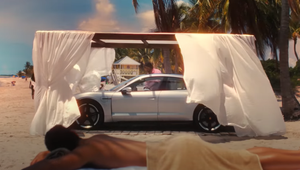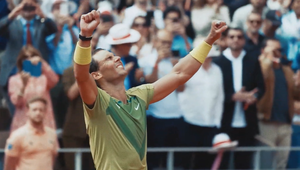
What If Brands Reinvented?

Haigo co-founder and head of design Patrick Maruejouls explores the broken imagination and possibility of brand reinvention.
The world as we know it is being turned upside down. With more than two billion people confined to their homes, lifestyles are being upended and I think we can all agree it’s safe to say there’s more upheaval to come... But you’ve already read plenty of articles about that.
So, what about brands? Some will be strengthened thanks to products and services that have become indispensable in times of confinement (think Netflix and Charmin). But those will be the exception. Most brands will find themselves weakened because, simply put, they have nothing to say during times of crisis.
Brands create imagination with their offer. They project you into worlds of fantasy where you are the hero.
The problem is that the power of projection is much weaker in times of crisis. Who can picture themselves at the wheel of an electric car when most of us can’t go much further than our nearest grocery store?
Who can think about what beer they’re going to order the next time they go out with a group of friends? Zoom calls just don’t paint the same picture.
So why is the story machine broken? It’s not actually directly related to lockdowns, quarantines and fears of getting a virus. In reality, the stories brands usually project us into are part of a past world. Our confine obstructs our acceptance of these stories and we can’t project ourselves into the future. In reality, it’s imagination that’s broken.
Rebuilding imagination…
Creating new imaginary worlds that integrate new realities will be vital in the aftermath of the crisis. Obviously, concerns about another pandemic, its effects on the economy, and the new ways of social interaction we’ve grown accustomed to will play a role. But the most important of all of these is meaning.
We’ll need to realise that superfluous claims risk being dismissed, inutility criticised and irrationality left in the dust, and the sooner we realise the better. Brands alone won’t be able to save the products and services that have been abandoned along the way. The first step will be understanding why customers have forgotten brands in such a short amount of time, without remorse. Aside from certain products that evoke nostalgia, and who may have seen their sales increase during this period, this will largely be the case.
We can all agree the outlook isn’t terribly rosy, but it’s better to accept that now so we’re able to react and regain control of our future. But what will be those elements that will define brands on the other side ?
What if the reinvented brand made commitments, and kept them?
These containment measures have been a severe change, all the more so because they’re being imposed on us. We’re realising that the jobs that are most useful to our society are those that are the least recognised and most often underpaid.
Let’s take farmers, who will be particularly affected by the crisis in France. Large grocery chains are suddenly standing up and expressing their support for the protection of French agriculture. But how sincere are they? The founder of one of France’s largest chains, Leclerc, was blasted for a recent LinkedIn post in which he tried to position the brand as a supporter of French agriculture. I’ll let you judge whether or not you think this action is opportunistic but I can tell you that the online reaction wasn’t kind. ‘We’ll see what happens in a month…’, ‘What I’d like to see is supermarkets supporting farmers year-round’, to paraphrase a few.
What these comments reveal is striking. Tomorrow's brands will have to embrace sustainable changes that are positive for their customers but also for ecosystems, and maintained over time, not just in exceptional circumstances.
What if the reinvented brand was more prudent about speaking out ?
What the current crisis is revealing is that it’s better to keep quiet when you have nothing to say. That doesn’t sound like much, but imagine for a second that this trend was to continue... Focus on the essential, on the perceptible value of the experience consumers get out of using your product or service.
This is probably a good time to ask yourself about the quality of your after-sales service, about the real value of your employees, about the concrete problem that your product or service solves...
The answers to these questions will allow you to strengthen your brand, to create new imaginations that are useful, meaningful, personified, and relevant.
So maybe it’s time we got rid of stock photos and mindless messaging?
What if the reinvented brand is there when things aren’t going right ?
Till now, brands have reacted to crises in two ways. Some opt to cut off all communication... Others speak out, but with empty messages, in mass emails that only serve to remind us that they have our data, gathered back when RGPD was nothing but a vague notion.
There is, however, a third, more commendable, route.
Within the last few weeks, we’ve seen the emergence of a new alternative, one of transparency that demonstrates consideration, and doesn’t overload consumers with automated, dehumanised discourse. These messages engage on a more personal and community level and speak to brands’ efforts to serve humanity beyond just their customers.
You’ve almost certainly seen the many initiatives, of all sizes, that have come about. From brands repurposing their production lines to providing much needed medical equipment to brands that share ways to help us deal with our new lives of confinement.
Tomorrow’s brands will have to anticipate these new contexts by being more agile. By focusing on the essentials and valuing the people and initiatives, they will find a more sustainable role in the face of future crises.
And if the reinvented brand was more humble?
First, brands need to be able to accept that they don’t have the answers to everything and certainly can’t have them right away. They need to accept the advice of experts, to trust and to work with all the links in the chain, and to make compromises that more largely benefit everyone. And they need to share these lessons without expecting anything in return.
Those are some important points that we can already take away from the current crisis.
The reinvented brand will have to be humble. It will communicate its defects to transform them into real areas for improvement. It will serve the ecosystem and its partners and it will share lessons learned.
What if the reinvented brand... was created today?
So, shall we ?










